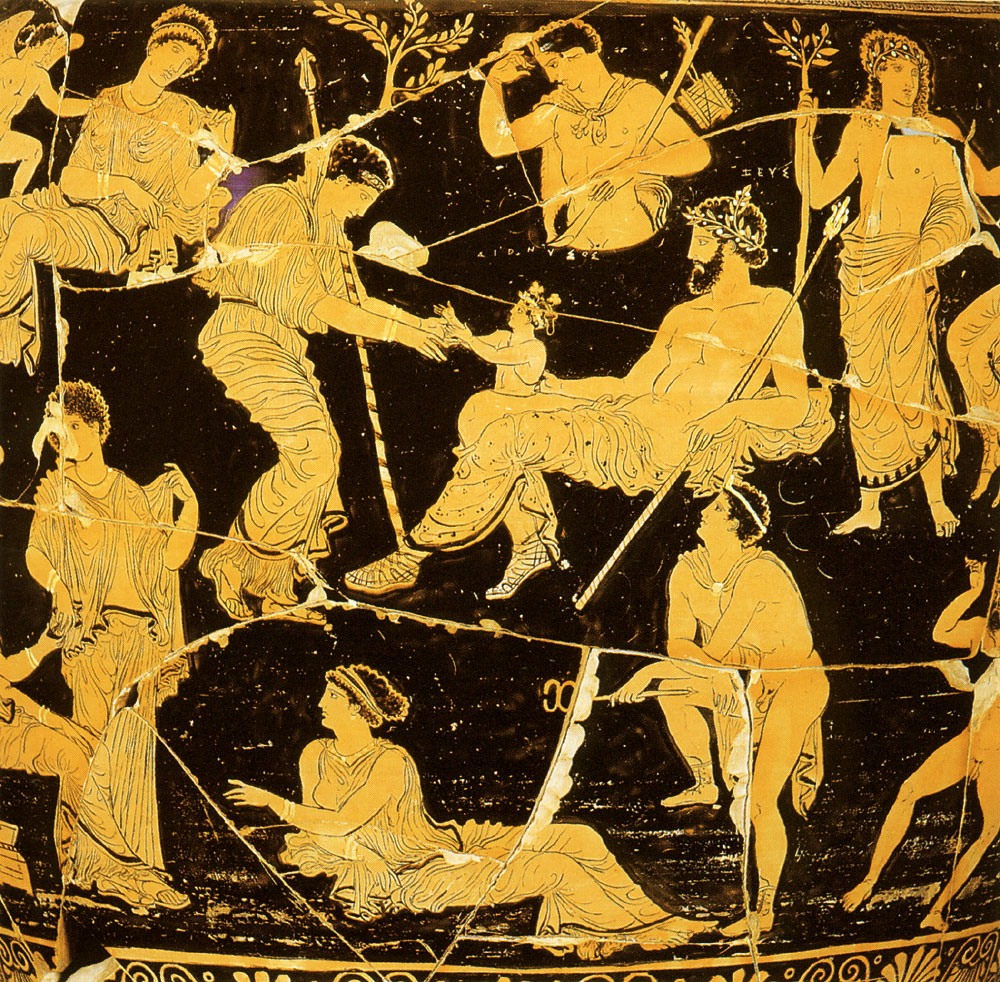Parties with drinking, dancing, and singing are rarely thought of as cults. Cults are often thought of as small religious groups that are frowned upon and viewed with suspicion by outsiders. Today, when we hear the word cult, we imagine people wearing white robes, creepy leaders and brainwashed followers who follow their leaders into rituals of mass suicide by Kool-Aid. In ancient Greece, however, everyone wanted to be a part of the Cult of Dionysus, where everyone would gather with free food, free wine, and the Goat Song.
Dionysus is the Greek God of wine, of winemaking, and of merriment and gaiety. He was supposed to have been born by the union of a mortal woman, Semele, princess of Thebes, and the greatest of the Greek gods, Zeus. Ancient Greek mythology holds that he was twice born, because when Semele was pregnant with Dionysus, Zeus took him and kept him in his thigh until he was ready to be born. While this may sound strange, there is a good explanation. Hera, Zeus’ wife who was also a goddess, had learned that Zeus had impregnated a moral woman; she was filled with jealousy and rage. The vengeful Hera disguised herself as a mortal woman and visited Semele. Once with her, she convinced Semele to ask Zeus to grant her one wish. When Semele asked for her one wish, Zeus promised to grant her anything. Semele asked Zeus to present himself in his true form, as a god not as a man, as suggested by Hera. Zeus kept his promise, but he knew that if Semele ever gazed upon him, she would die. So when he revealed himself to Semele in his true form, Zeus had Hermes take Dionysus from her womb and placed him into Zeus’ thigh so that he would not also die with Semele.1

As the god of wine, Dionysus is supposed to spread the knowledge of how to grow grape vines. In ancient Greece, wine was one of the few goods they could produce. Because of this, Dionysus was a major deity, and it was said that he was one of the twelve gods that lived upon Mount Olympus. Temples were erected in his honor and worship of him spread throughout the Greek poleis. Annual festivals called Dionysia were held in his honor and, of course, the purpose was to relax, feast, dance, and drink wine.2

Some dances in honor of Dionysus were performed on oiled wineskins, which were bags made out of animal skins that were filled with wine. Dionysus loved goats, donkeys, and tigers. Not only were those animals at the Dionysia, but their skins were also danced upon. When someone fell off the oiled wineskins, everyone cheered, laughed, and drank wine.
The Greeks held competitions to see who might be the manliest man and who could drink a pitcher of wine the fastest. The winner would receive a smaller oiled wineskin as a trophy, which was essentially another container of wine.3

At the annual Dionysia, the Goat Song was also preformed. The Goat Song gave birth to Greek drama. Originally, a song or hymn was sung as a goat was being sacrificed to Dionysus. The song often addressed questions that were arising about divine law, judgement, and various social conflicts of general concern. The Goat Song was seen as something of a group discussion or address of common concerns, and as a way for people collectively and individually to purify their minds. The hymn then became a performance piece, sung by a chorus. The performance evolved over time to include first a monologue, and then with the addition of a second voice, a dialogue. Eventually, more voices were added, and the performance of the Goat Song became the tragic drama we have come to associate with the great Greek tragedians Aeschylus, Sophocles, and Euripides. In fact, the Greek word tragedia, from which we get our word tragedy, literally translates as “the song of a male goat.” The Greeks truly loved drama because they felt that the gods were speaking to them and judging their piety, rather than merely being annoyed by them.4
The cult of Dionysus does not seem so suspicious now. There were not any outrageous daily rituals or strange articles of clothing they had to wear. The cult of Dionysus consisted of dancing, drinking, singing, and feasting, every college student’s four favorite things.
- Salem Press Encyclopedia, January 2016, s.v. “Dionysus,” by Rebecca K. Rector. ↵
- Eleni Pachoumi, “Dionysus in the Greek Magical Papyri,” Symboae Osloenses 88, no. 1, (2014): 129. ↵
- Alana Koontz, “The Art and Artifacts Associated with the Cult of Dionysus,” (Masters Thesis, University of Wisconsin-Milwaukee, 2013), 4. ↵
- Britt-Mari Näsström, “The rites in the mysteries of Dionysus: the birth of the drama,” Åbo Akademi: Open Journal Systems. (2014): BASE, EBSCOhost. ↵



77 comments
Andrea Chavez
This is a very good article; I always had a fascination for Greek mythology. I really liked how you introduce the story by giving background of who Dionysus is, it helped me get into context much faster. Now it’s really funny how what we consider simply hanging out or going to a party, in those times was considered a cult. It now makes me wonder if this would still be considered a cult in our society.
Andrew Rodriguez
This article was very interesting in getting a cult, of not of our modern views instead of glorifying it and wanting to be part of it. I did not know that if a god showed his true form to a mortal that they die. I assume that the presence, of one will just overwhelm the human. To me he seemed like the most likeable god out of all the gods, just since the festivals that were thrown for him alone. It’s crazy how something so simple as wine making, brought so much joy to the Greek gods, who have so much more power and importance than Dionysius.
Benjamin Voy
This article is not what I had expected at all. I totally agree with the write, in that when i hear the word ‘cult’ i think of some dodgy religious group with their weird rituals. But the “Cult of Dionysus” is definitely a cult that I would have wanted to have been a part of. I also find the story of how Dionysus was born fascinating. To think that he was grown inside the thigh of his father is something special and very imaginative from the greeks. An interesting and intellectual read.
Alondra Aviles
This article was very interesting and intriguing, although, it felt almost as if I was reading about a Frat party. Greek mythology has always been a topic of interest and controversial stories; clearly stated due to the “wine cult”. Zeus and his wife seem to always be portrayed as the main characters in many mythological stories, ending with Zeus engaging in infidelity and creating demi gods left and right. These parties although, seemed incredibly exclusive and not much different from those we have now. The rituals and festivities seem like “godly” fun. Otherwise great article, informative and entertaining.
Sarah Mares
The God of wine, winemaking, merriment and gaiety, Dionysus, lived the life of the ultimate Greek party animal. I found it very entertaining to read of Dionysus’ upbringing between his mortal mother, Semele, his king-like father, Zeus, and his jealous step-mother, Hera. I’ve always admired Greek mythology for the creative thoughts and details placed in its ancestry. From starting off as a mere song sung during goat sacrifices, to that which tended to people’s concerns, to a performance piece, finally to a tragic drama, I found the evolution of the Goat Song to be a unique changing of circumstances in which to use the song. Dionysus lived the good life as the God of wine and led those in his cult in continuous luxuriously relaxed lives as well.
Nahim Rancharan
Let me start off my mentioning how enjoying it was to read every bit of this article! I had read the introduction and it just kept me wanting to read more. I am a fan of Greek history and I liked how you managed to shed light on another one the the Greeks’ many famous tradition. I mean who doesn’t love wine and partying? Additionally, I found it interesting how you were able to take such an old tradition and make it relatable to present day, comparing it to the same interests shared by college students today. Your use of words and imagery just captured my attention from the very beginning. Although this is not one of the most famous traditions, I liked how you managed to draw a great deal of attention to it. Overall, it was excellently organized and very insightful. I look forward to reading more!
Sergio Cervantes
Great article written over this group of people! I will admit I was a bit concerned as to what I would read when I saw the title; however, I am glad I did! I believe the use of the word “cult” has changed over the years used now to describe fanatical groups. But it is interesting to read about the different events they had and how humans during this time celebrated the Greek gods. It is fascinating to read about the Goat song and the numerous rituals that were performed while this was playing.
Ana Gonzalez
Great article, it was a very fun read. I like your introduction because I was already assuming that the cult of Dionysus would sacrifice people or something dark like that. However, you talked about how this cult dances and parties to honor the Greek God in order to produce more wine. You did a great job of explaining where this idea originates from.
Great article!
Nelson Smithwick
Comparing the cult of Dionysus to modern college students was a hilarious ending to your article. These people seemed to have a great time, and The Goat Song sounds like a very interesting performance, especially with the statements on divine law and other social issues of the time and I would really like to hear what it would sound like.
Aimee Trevino
Great article! Your introduction was really well written, and really well planned out. Your intro really helped get my attention. In all honesty even the first sentence really got my attention. Your word choice, even with your title alone by using the word “cult” helped to keep me interesting as to what your article would be about, and how it would end. Well done!